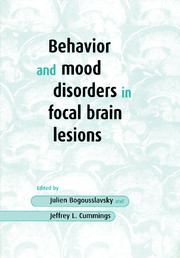Book contents
- Frontmatter
- Dedication
- Contents
- List of contributors
- Preface
- Acknowledgments
- 1 Emotional consequences of focal brain lesions: an overview
- 2 The evaluation of mood and behavior in patients with focal brain lesions
- 3 Methodological issues in studying secondary mood disorders
- 4 Emotional behavior in acute brain lesions
- 5 Depression and lesion location in stroke
- 6 Mood and behavior in disorders of the basal ganglia
- 7 Mania and manic-like disorders
- 8 Behavioral and emotional changes after focal frontal lobe damage
- 9 Disorders of motivation
- 10 Thalamic behavioral syndromes
- 11 Obsessive-compulsive disorders in association with focal brain lesions
- 12 Emotional dysprosody and similar dysfunctions
- 13 Temporal lobe behavioral syndromes
- 14 Neural correlates of violent behavior
- 15 Focal lesions and psychosis
- 16 Alterations in sexual behavior following focal brain injury
- 17 Anosognosia
- 18 Acute confusional states and delirium
- Index
2 - The evaluation of mood and behavior in patients with focal brain lesions
Published online by Cambridge University Press: 05 August 2016
- Frontmatter
- Dedication
- Contents
- List of contributors
- Preface
- Acknowledgments
- 1 Emotional consequences of focal brain lesions: an overview
- 2 The evaluation of mood and behavior in patients with focal brain lesions
- 3 Methodological issues in studying secondary mood disorders
- 4 Emotional behavior in acute brain lesions
- 5 Depression and lesion location in stroke
- 6 Mood and behavior in disorders of the basal ganglia
- 7 Mania and manic-like disorders
- 8 Behavioral and emotional changes after focal frontal lobe damage
- 9 Disorders of motivation
- 10 Thalamic behavioral syndromes
- 11 Obsessive-compulsive disorders in association with focal brain lesions
- 12 Emotional dysprosody and similar dysfunctions
- 13 Temporal lobe behavioral syndromes
- 14 Neural correlates of violent behavior
- 15 Focal lesions and psychosis
- 16 Alterations in sexual behavior following focal brain injury
- 17 Anosognosia
- 18 Acute confusional states and delirium
- Index
Summary
Introduction
Many studies have investigated focal brain lesions as a basis for cognitive impairment but less attention has been given to their role in the etiology of mood and behavior disorders. Both as a cause and as an effect of that disparity, the measures that are available for the cognitive assessment of patients far outnumber those that might be utilized for the assessment of disorders of mood and behavior. Although there is currently greater potential for the effective pharmacologic treatment of mood and certain behavior disorders than of cognitive impairment in patients with focal brain lesions, it is likely that many patients with such disorders remain undiagnosed due to the underutilization of those standardized assessments that are available and to an understandable emphasis on the physical disabilities that may result from those lesions. Thus, this chapter describes certain of the methods that are available for the evaluation of mood and behavior disorders in patients with focal brain lesions as well as some of the difficulties inherent in the evaluation of neurologic patients with those disorders.
Overview of the characteristics of assessment tools Although the diagnosis of major depression has frequently been based on simple clinical judgment in investigational studies, particularly those in which mood disorders were not the primary focus, scales that have been utilized to assist in that diagnosis have taken many forms, varying with regard to the following characteristics:
Mode of administration, i.e., is the scale administered to the patient by an examiner or is it self-administered?
Depth of inquiry regarding specific aspects of the syndrome of major depression, such as vegetative signs.
Duration of symptoms, i.e., must symptoms have been present during a specified period preceding the assessment?
Item scoring method, e.g., true-false, severity ratings.
Potential for use as a formal diagnostic tool, i.e., adherence to codified diagnostic paradigms such as the criteria presented in the Diagnostic and Statistical Manual of Mental Disorders,fourth edition (DSM-IV; American Psychiatric Association, 1994) versus the use of a simple cut-off score or no formal diagnostic method.
The complexity of the scale and the cognitive demands that it places on the patient.
- Type
- Chapter
- Information
- Behavior and Mood Disorders in Focal Brain Lesions , pp. 21 - 47Publisher: Cambridge University PressPrint publication year: 2000



